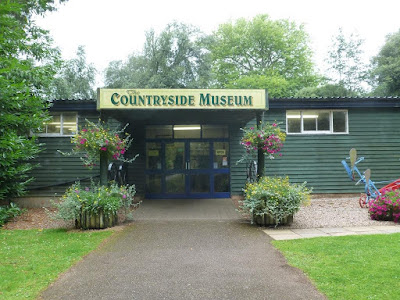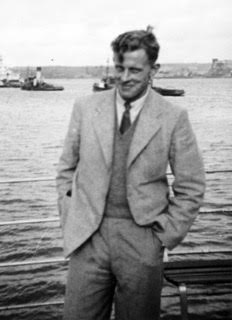The founder of the Bicton Countryside Museum
Continued
from http://budleighbrewsterunited.blogspot.co.uk/2015/11/bictons-countryside-museum-gets-new.html
It’s
good to see in the new Bicton Countryside Museum guidebook a few pages about
its founder N.D.G. James. The story of the James Collection, as it’s now known,
is really worth telling.
The Fordson tractor, built by the Ford Motor Company in Dearborn, Michigan, USA, dates from 1917 and is probably one of the oldest in the UK. You may recognise the scarecrow driver
Farming and agriculture make up so much of the Lower
Otter Valley, stretching from Budleigh Salterton to Newton Poppleford, that
it’s only right that they should have their place in any local museum.
The threshing machine would definitely not fit into Fairlynch. Built by Marshall Sons & Co Ltd, Gainsborough, Lincolnshire and delivered to the now defunct Exeter-based mechanical engineering firm of Taylor & Bodley on 18 August 1890
Sadly,
Fairlynch simply does not have the space for a display on the scale of the Bicton
Countryside Museum.
The wheelwright's workshop
But
maybe ‘Jimmy’ James would have discussed the possibility of a farming section at
Fairlynch with its founders back in those early days nearly half a century ago
when our Museum had only just been launched.
The smithy, with scarecrow smith provided by East Budleigh
On
8 March 1968 at 7.30 pm in Budleigh Salterton’s Masonic Hall, Mr James gave an illustrated talk entitled ‘Trees of the
South-West’ presented by Fairlynch Museum. The speaker was billed as a Past
President of the Royal Forestry Society of England, Wales and Northern Ireland
and admission was 3/6 (3 shillings and six pence) for adults and 1/- (one
shilling) for schoolchildren.
The dairy: how it was in the past
Originally from Monmouthshire, ‘Jimmy’ James
(1912-93) OBE, MC, TD, MA, FRICS, FICFor, was educated at Haileybury and Oxford
University. He joined the Society of
Foresters of Great Britain as a young land agent but was also a member of the
Honourable Artillery Company, where his appointment as Second Lieutenant was
announced in the London Gazette of 29 December 1933.
After distinguished service with the Royal
Artillery during World War Two, for which he was awarded the Military Cross, he
left the Army with the rank of Lieutenant Colonel. For a time he lived at Nuneham Courtenay in
Oxfordshire, where he was Churchwarden of All Saints Church. He was
Churchwarden of St Mary’s Church, Bicton, from 1967 until his death in 1993,
having settled in East Devon as Land Agent to Lord Clinton.
He made an active contribution to the
development of the teaching of Arboriculture, setting up the examinations of
the Royal Forestry Society and becoming its President as well as President of
the Chartered Land Agents Society.
Some of this machinery brought back childhood memories of working on my family's market garden
He was awarded the OBE for services to
forestry in 1964, and was widely known in forestry circles for his books on the
subject. They included The Forester's Companion (1955), A
Pictorial Guide to Bicton Gardens (1970), A History of English Forestry (1981), and A Forestry Centenary: the history of the Royal Forestry Society of
England, Wales, and Northern Ireland (1982)
He was also a writer on
military history, publishing Plain Soldiering. A history of the armed forces on
Salisbury Plain (1987).
A beautifully displayed set of woodworking tools
During his time as Land Agent, as
the Bicton
Countryside Museum guidebook tells us, he took on the task of visiting the several hundred
tenanted estate farms to search out redundant and surplus everyday items. He
collected tools, household items, farm machinery and the paraphernalia of rural
trades and businesses.
I remember this six-ton steam roller. It bears a plaque with the name of W.W. Buncombe, Highbridge, in Somerset, a few miles from where I was brought up
“Everything from the mundane to
the magnificent was the subject of James’s quest to document more than a
century of rural life and, as word spread, it was not long before he was being
offered items from further afield. Nothing, it seems, was declined, and
although the majority of the collection is founded on locally sourced exhibits,
others have found their way to Bicton from across the UK, including the Home
Counties, East Anglia, Scotland and Ireland.”
‘Jimmy’ James is remembered at
Bicton not just in the Bicton
Countryside Museum guidebook but also in the excellent film about the Museum
which visitors can see.
In St Mary’s Church, just a few minutes from the
Museum, is the fine stained glass window set up as a memorial to his wife Laura
Cecilia, who was only 45 when she died, and their second son Alastair Rupert
Clifford who died on 15 September 1960 aged only six.
Mr James himself is
remembered in the adjacent wooden tablet erected by his surviving sons and his
daughters-in-law.














Comments
Post a Comment